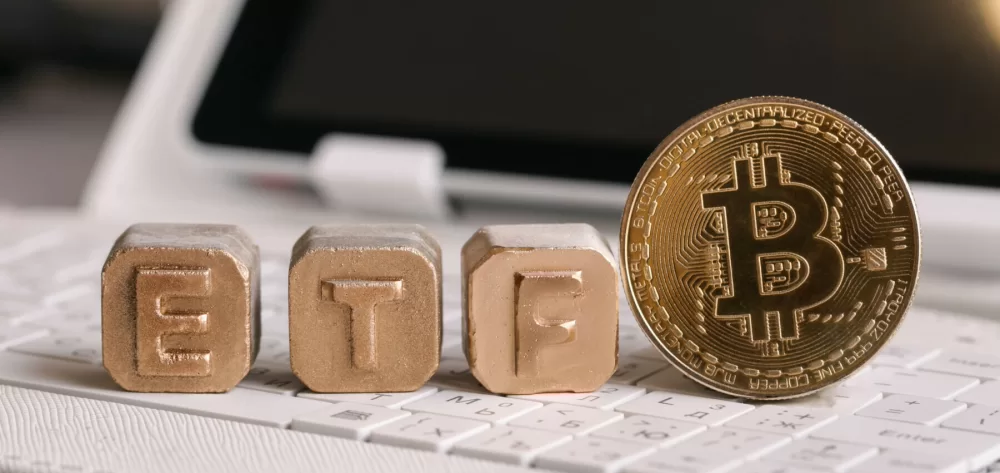Investors looking to invest in bitcoin now have a new possibility in the form of exchange-traded funds (ETFs) that track the bitcoin spot price. Find answers to your questions about what bitcoin ETFs are and how to invest in them in this guide.
What has changed?
On January 10, 2024, the United States Securities and Exchange Commission (SEC), which monitors the US securities market, approved the first bitcoin spot ETFs for public trading. The decision followed a long period of speculation.
What is a bitcoin ETF?
A bitcoin ETF is a fund that investors can use to participate in bitcoin price developments without having to buy and hold bitcoin themselves. ETFs are relatively simple investment funds with shares that can be bought and sold on stock exchanges just like stocks.
The difference between the bitcoin spot ETFs and existing bitcoin ETFs is that ETFs approved before January 10, 2024 use bitcoin futures. That means they only invest in futures – derivatives that let them speculate on the future development of bitcoin prices. The bitcoin spot ETFs approved in 2024, on the other hand, track the going market price of the world’s most famous cryptocurrency down to the second.
What are the advantages of bitcoin ETFs?
The new ETFs add credibility to bitcoin because they are subject to tighter regulations. The ETFs also open bitcoin to investments by institutional investors and mainstream private investors.
Investors who already hold bitcoin may also profit. Experts believe that the opening of the market to new circles of buyers could push up the price of bitcoin over the long term. However, the price of bitcoin initially fell in the days following the announcement of the bitcoin spot ETF approvals.
What are the risks of investing in bitcoin ETFs?
The risks of bitcoin ETFs are primarily linked to the underlying asset they track – bitcoin. Cryptocurrencies draw buyers with the prospect of potentially high returns, but their prices developments are typically volatile and unpredictable. These factors expose you to a high risk of loss. That is true whether you invest in bitcoin directly or using ETFs.
Which bitcoin ETFs are there, and how high are their fees?
So far, the SEC has approved a total of eleven bitcoin spot ETFs.
The ongoing costs of a fund is shown as its total expense ratio (TER). There are major differences in the TERs of different bitcoin spot ETFs (see Table 1).
Table 1: Bitcoin spot ETFs ranked by TER
| ETF |
ISIN |
TER |
| Franklin Bitcoin ETF |
US3549211080 |
0.19% |
| Bitwise Bitcoin ETF |
US09174C1045 |
0.20% |
| Van Eck Bitcoin Trust |
US92189K1051 |
0.20%* |
| ARK 21 Shares Bitcoin ETF |
US0409191022 |
0.21% |
| Coin Shares Valkyrie Bitcoin Fund |
US91916J1007 |
0.25% |
| Fidelity Wise Origin Bitcoin Fund |
US3159481098 |
0.25% |
| Invesco Galaxy Bitcoin ETF |
US46091J1016 |
0.25% |
| iShares Bitcoin Trust |
US46438F1012 |
0.25% |
| Wisdomtree Bitcoin Fund |
US97720F1012 |
0.25% |
| Hashdex Bitcoin ETF |
US88634V1008 |
0.90% |
| Grayscale Bitcoin Trust |
US3896371099 |
1.50% |
*No fees through January 2026.
Date: 15.01.2024. Source: Information published by fund managers. This list is not intended to be exhaustive.
How can Swiss investors use bitcoin ETFs?
As an investor in Switzerland, you can buy shares in bitcoin ETFs using a stock brokerage account, just as you would invest in other ETFs or in individual stocks. From a cost perspective, it is advisable to use a brokerage account from a bank that specializes in low-cost online trading. You can compare Swiss stock brokerage accounts here.
Bitcoin ETFs are not approved in the European Union (EU) for legal reasons.
Which are the cheapest Swiss banks for investing in bitcoin ETFs?
In addition to the TER charged by the bitcoin ETF itself (see table 1), there are also other investment costs for Swiss investors. These include brokerage fees and Swiss federal stamp duties when you buy and sell ETF shares, and custody fees for holding your shares. Because the currently-available bitcoin spot ETFs are traded on US stock exchanges, the fees charged by Swiss banks for American stocks generally apply.
Table 2: Fees charged by Swiss banks for a purchase of USD 1000 worth of shares in a bitcoin ETF (with a total of USD 10,000 of securities in account)
| Bank |
Brokerage fees
(including Swiss stamp duties) |
Custody fees and
account fees |
Total fees and
charges |
| Cornèrtrader |
CHF 14.85 |
CHF 0.00 |
CHF 14.85 |
| Saxo Bank |
CHF 2.25 |
CHF 21.40 |
CHF 23.65 |
| Postfinance |
CHF 19.35 |
CHF 72.00 |
CHF 91.35 |
| Swissquote |
CHF 6.60 |
CHF 86.50 |
CHF 93.10 |
| Migros Bank |
CHF 41.35 |
CHF 54.05 |
CHF 95.40 |
Calculations are based on a USD 1000 investment in a bitcoin ETF, and an average balance of USD 10,000 worth of securities in your account. Date: January 10, 2025.
Note: This article is published for informational purposes only, and should not be considered investment advice. moneyland.ch does not accept any liability in connection with this article.
More on this topic:
Should I invest in bitcoin?
Swiss bitcoin investment calculator
Compare Swiss stock brokerage accounts
How to buy bitcoin and use it to pay in Switzerland
A guide to Ethereum ETFs

 Deal of the Day
Deal of the Day 




